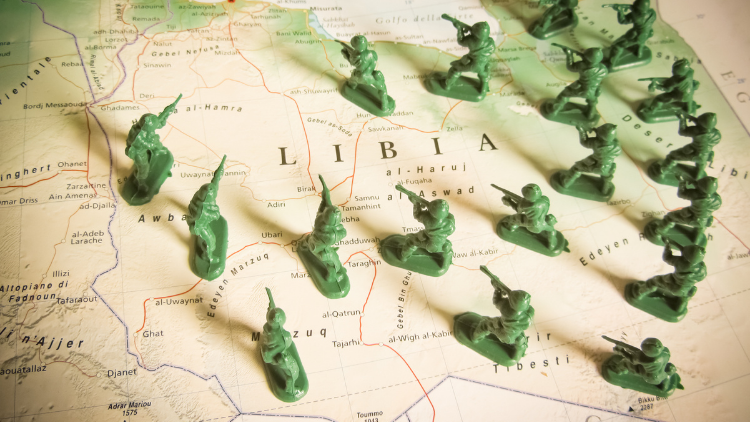MENAPOL Blog
The Libyan Conflict: Turkey Flexing its Muscles

When the Libyan conflict started shortly after the assassination of former President of Libya Muammar Muhammad Abu Minyar al-Gaddafi, it was difficult to foresee this act of violence turning into an international conflict. Today, with the involvement of several regional powers including Egypt, Saudi Arabia, Iran, Syria, and the United Arab Emirates, it’s clear the conflict has lost its domestic character.
With strong international and regional powers taking the side of the Libyan National Army (LNA) led by Field Marshal Khalifa Belqasim Haftar, Turkey stands in murky waters in its support of the Government of National Accord (GNA), led by its Prime Minister Fayez Al-Sarraj, who is also the head of the Presidential Council of Libya. Unlike earlier regional endeavors, this particular Libyan scheme is bringing Turkey to face too many powers, and the outcomes are hard to predict. Turkey is probably taking its odds, flexing its muscles but at a very high price.
The Fall of Qaddafi on a NATO-led campaign left Libya in ruins. Two major powers rose from the different militias striving for power in the country, namely the GNA with its Prime Minister Fayez Al-Sarraj and the Haftar-led LNA. While the GNA is acknowledged by the United Nations, Hafter receives the backing of several regional powers as he posits himself as the fighter against extremism. The conflict has been going on for years but took a sharp turn when in April 2019 Haftar forces tried to capture Tripoli, which led to a major escalation and several regional powers sending assistance to the LNA.
Both powers have their support from different international and regional powers. The United States is generally on the side of Al-Sarraj along with Turkey and Qatar while Haftar has the support of the UAE, Egypt, Saudi Arabia, Russia, and France. The kind of assistance offered by these powers varies from air support, to weaponry, and funds. While some outside players have interests in the Libyan oil reserves, some others have the Muslim Brotherhood in mind.
The Muslim Brotherhood faction in the GNA brought Turkey and Qatar to the side of the GNA but also brought the UAE, Saudi Arabia, Egypt and Jordan to the side of the LNA. This is surely not to imply that Turkey in particular is purely involved for ideological reasons. Signing a controversial maritime boundary agreement with the GNA, Turkey will have access to dwell vast gas reserves in the East Mediterranean. Likewise, the concern for the oil brings Russia, Italy, and France to take stakes in the Libyan conflict.
The situation today is tragic with tens of thousands of Libyans displaced because of the prolonged conflict. Migrants drowning at the Libyan coasts, fleeing the warfare, or transiting on their way to Europe has become common news. Syrian mercenaries were rumored to be employed on the GNA side. Likewise, the Haftar side may have used Russian mercenaries to enhance its chances. Although the GNA still demonstrates the power to fight back and push the LNA forces out of western parts of Libya, thanks mainly to Turkish assistance which seems to have stood fairly well in the face of Russian military supplies to Haftar, the lack of a unified European position towards the conflict aggravates the situation and leaves the door open to Russian endeavors in Libya and elsewhere.
The Libyan political landscape is neither simple nor straightforward, with militias that include Islamic state jihadist elements along with the two key powers involved in the battles. Egypt, which takes the Haftar side won’t hand Libyan territory to Islamists on a silver platter. Concerned about the prospect of instability and Islamist elements in the Libyan conflict, Egypt overtly sends forces into its western neighbor for national security reasons; and its intervention isn’t groundless; between 2014 and 2017, several Egyptian border guards were killed at the hands of jihadists.
When it comes to the prospect of Turkey bettering GNA chances, a few factors should be taken into account: although it seems that the GNA has strong international backup with the US on its side, but this is not the case. Under United States’ President Donald Trump’s rule, there was hardly any real American assistance to the GNA; Trump even praised Haftar on one occasion, bewildering the international community on America’s ultimate standing. Additionally, the Haftar team seems to have some power to block international support for his opponent Al-Sarraj. An infamous incident in this regard was the French intervention to block an EU statement requiring Haftar to stop his Tripoli offensive in 2019. More recently, both Russia and China blocked the release of UN report on the violation of the UN arms embargo in Libya by warring parties and their outside backers.
Yet, Egypt’s involvement in the conflict tilts the balance away from Turkey which ranks, together with Italy and Qatar, in 2020 lower than Egypt in military strength. Egypt also came first among Middle East military forces in the rankings of the year 2020. Likewise, having the US and Russia, which rank first and second respectively in military strength for 2020, on two opposing sides of the conflict makes it very unlikely that the warfare will come to an end upon the initiative of one side solely, but not the other because this simply results in one of the two key international backers making progress vis-a-vis the other in Libya.
Needless to say, Turkey is trying to portray its intervention in Libya as saving the country from bloodshed, allegedly with the ultimate goal of resolving the political conflict. But the parallel talks on infrastructure and oil cooperation schemes raise doubt regarding the sincerity and benevolence of the Turkish claims. Each country involved in the Libyan conflict has its own good reasons for reaching out to one of the rival parties, and while Turkey did a good job in helping out the GNA to keep Haftar forces away from some parts of Libyan territory, it will surely have to face the fact that other outside players won’t give up easily on the LNA. Turkey might have attained an edge with its relatively early intervention in the conflict, but this doesn’t negate the readiness of Haftar supporters to exert more effort towards curbing Turkish plans in Libya. It is definitely a high-priced intervention on the part of Turkey, especially if the US, which is only half-heartedly supporting Al-Sarraj, chooses to stay at the shores of the GNA-LNA struggle.
About the Author

